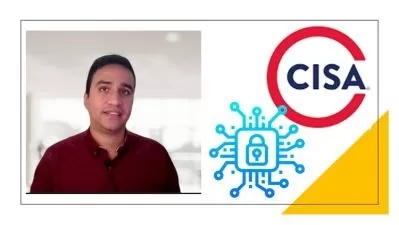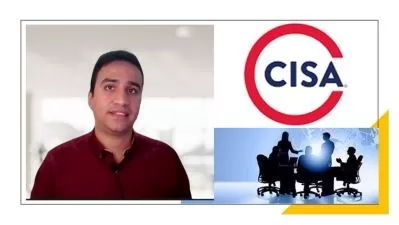Certified Internal Auditor (CIA) Part 1 - Full Study Course
Adrian Resag, QIAL, CMIIA, CIA, CISA, CRMA, CFSA, GRCP, CIMA Adv Dip MA
7:08:35
Description
Full study course and instructor support for the Certified Internal Auditor (CIA) Part 1.
What You'll Learn?
- What you need to be proficient at for the Certified Internal Auditor (CIA) Part 1 exam.
- The essentials of internal auditing.
- Exam preparation strategy and tips and tricks for the exam.
- Understand the role that internal audit functions play in an organization.
- Know the key principles and standards of the internal auditing.
- Know how to apply key concepts such as independence and objectivity.
- Learn how to keep in good standing by knowing how to follow the code of ethics and how to show due professional care and proficiency.
- Know whether your reporting lines are appropriate and how to improve your department through quality assurance.
- Learn about the essential areas of governance, risk management and internal controls where auditors put much of their work effort.
- Learn how to react if you suspect fraud within your organization.
Who is this for?
More details
DescriptionWelcome to this exam preparation course for the Certified Internal Auditor (CIA), a certification from the Institute of Internal Auditors (IIA).
This course aims to decrease the time you need to prepare for the exam. It includes instructor support for your questions.
IÂ have taught internal audit courses in person to hundreds of internal auditors and other interested professionals and I would finally like to share this with you as well online. The course covers all areas in which you need to be proficient through 82 lectures.
This course has helped many people improve their chances at the CIA, from global Chief Audit Executives to interested students: this course is suited for anyone with an interest in internal audit.
It will help you understand the role that internal audit functions play in an organization and the principles and standards of the profession. It will help you know how to apply key concepts such as independence and objectivity. You will learn how to keep in good standing by knowing how to follow the code of ethics and how to show due professional care and proficiency.
If you manage an internal audit team or want to be ready for when you do, it will help you know whether your reporting lines are appropriate and how to improve your department through quality assurance. You will learn about the essential areas of governance, risk management and internal controls where auditors put much of their work effort. Finally, you will better know how to react if you suspect fraud within your organization.
Most importantly, it aims to help you ‘think’ like an internal auditor, which I find is essential for scoring highly on the exam as well as being a great internal auditor.
The course covers:
CIA Part 1 Introduction and Exam Strategy
Introduction to the CIA certification, overview of the content of CIA Part 1 and exam strategies.
Fundamental concepts of Internal Auditing
Understand the purpose of an internal audit function, what internal audit does and the principles, framework and standards of the profession.
Independence, Objectivity and Ethics
Proficiently understand the critical notion of independence and be able to identify if an audit function has organizational independence.
Know how to always act ethically as an internal auditor.
Due Professional Care and Proficiency
Know which areas internal auditors need to be proficient (and which they don’t). Learn how to show or identify due professional care.
Recognize how this affects the staffing of internal audit functions.
Quality Assurance and Improvement Program
Know how to conduct an internal audit quality internal assessment and how external assessments must be performed.
Governance, Risk Management and Internal Control
Gain an understanding of internal audit’s role in governance, risk management and internal controls.
Learn about different frameworks for assessing these areas.
Fraud Risks and Culture
Learn how to identify fraud risks and what to do if fraud is suspected. See how internal audit can change an organization’s culture.
Who this course is for:
- Students preparing for the Certified Internal Auditor (CIA) exam.
- Internal auditors.
- External auditors.
- Financial controllers or management accountants.
- Finance, accounting or business students.
- Risk managers.
- Accountants (CPA, ACCA, Chartered Accountants, etc.).
- Anyone working with internal auditors or undergoing an internal audit.
Welcome to this exam preparation course for the Certified Internal Auditor (CIA), a certification from the Institute of Internal Auditors (IIA).
This course aims to decrease the time you need to prepare for the exam. It includes instructor support for your questions.
IÂ have taught internal audit courses in person to hundreds of internal auditors and other interested professionals and I would finally like to share this with you as well online. The course covers all areas in which you need to be proficient through 82 lectures.
This course has helped many people improve their chances at the CIA, from global Chief Audit Executives to interested students: this course is suited for anyone with an interest in internal audit.
It will help you understand the role that internal audit functions play in an organization and the principles and standards of the profession. It will help you know how to apply key concepts such as independence and objectivity. You will learn how to keep in good standing by knowing how to follow the code of ethics and how to show due professional care and proficiency.
If you manage an internal audit team or want to be ready for when you do, it will help you know whether your reporting lines are appropriate and how to improve your department through quality assurance. You will learn about the essential areas of governance, risk management and internal controls where auditors put much of their work effort. Finally, you will better know how to react if you suspect fraud within your organization.
Most importantly, it aims to help you ‘think’ like an internal auditor, which I find is essential for scoring highly on the exam as well as being a great internal auditor.
The course covers:
CIA Part 1 Introduction and Exam Strategy
Introduction to the CIA certification, overview of the content of CIA Part 1 and exam strategies.
Fundamental concepts of Internal Auditing
Understand the purpose of an internal audit function, what internal audit does and the principles, framework and standards of the profession.
Independence, Objectivity and Ethics
Proficiently understand the critical notion of independence and be able to identify if an audit function has organizational independence.
Know how to always act ethically as an internal auditor.
Due Professional Care and Proficiency
Know which areas internal auditors need to be proficient (and which they don’t). Learn how to show or identify due professional care.
Recognize how this affects the staffing of internal audit functions.
Quality Assurance and Improvement Program
Know how to conduct an internal audit quality internal assessment and how external assessments must be performed.
Governance, Risk Management and Internal Control
Gain an understanding of internal audit’s role in governance, risk management and internal controls.
Learn about different frameworks for assessing these areas.
Fraud Risks and Culture
Learn how to identify fraud risks and what to do if fraud is suspected. See how internal audit can change an organization’s culture.
Who this course is for:
- Students preparing for the Certified Internal Auditor (CIA) exam.
- Internal auditors.
- External auditors.
- Financial controllers or management accountants.
- Finance, accounting or business students.
- Risk managers.
- Accountants (CPA, ACCA, Chartered Accountants, etc.).
- Anyone working with internal auditors or undergoing an internal audit.
User Reviews
Rating
Adrian Resag, QIAL, CMIIA, CIA, CISA, CRMA, CFSA, GRCP, CIMA Adv Dip MA
Instructor's Courses
Udemy
View courses Udemy- language english
- Training sessions 80
- duration 7:08:35
- Release Date 2022/12/06













